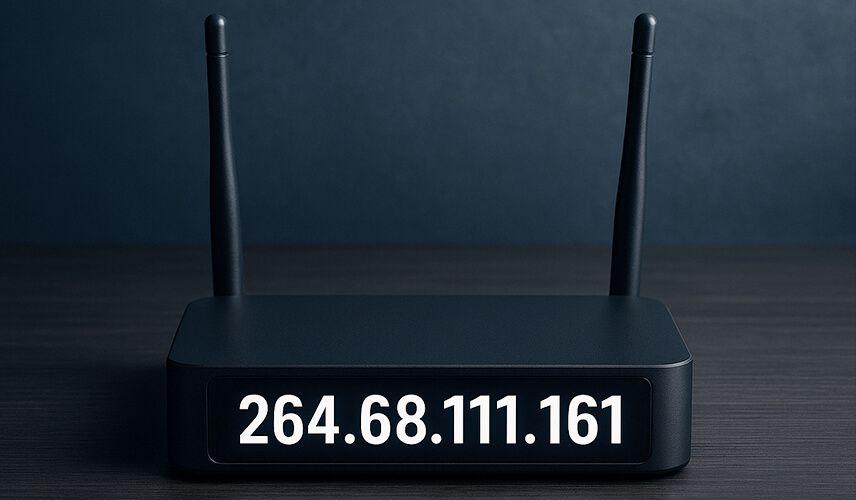264.68.111.161: Everything You Need to Know About This Invalid IP Address
The sequence 264.68.111.161 appears to be a standard IPv4 address at first glance. However, a closer inspection reveals that it is not a valid IP address according to Internet Protocol standards. In this comprehensive guide, we’ll explore what 264.68.111.161 is, why it’s invalid, potential reasons you might encounter it, and what implications it has for networking, cybersecurity, and SEO.
What Is 264.68.111.161?
An IP address is a numerical label assigned to devices on a network, enabling them to communicate with each other. IPv4 addresses consist of four numbers (octets) separated by dots, with each octet ranging from 0 to 255.
The address 264.68.111.161 contains the number 264 in the first octet, which exceeds the maximum allowed value of 255. This makes 264.68.111.161 technically invalid and unusable in real-world networking scenarios.
Why Is 264.68.111.161 Invalid?
- IPv4 Octet Range: Each segment (octet) in an IPv4 address must be between 0 and 255. The presence of 264 violates this rule, rendering the address invalid.
- Not Recognized by Networking Standards: Devices and networking software will not accept or route traffic to or from this address, as it falls outside the defined IPv4 range.
Related: 185.63.253.300: Understanding the Invalid IP Address
Common Reasons for Encountering 264.68.111.161
Even though 264.68.111.161 is not a legitimate IP address, you might still come across it in various contexts:
- Typographical Error: The most frequent cause is a simple typo, such as entering 264 instead of a valid number like 164 or 254.
- Educational Use: Networking tutorials and textbooks sometimes use invalid IPs like this to illustrate what not to use or to highlight the importance of correct formatting.
- Configuration Mistakes: Network administrators might accidentally enter an invalid address during device configuration, which can lead to connectivity issues.
- Deliberate Obfuscation: In cybersecurity, invalid IPs might be used as placeholders or to mask real addresses in documentation or logs.
- Malicious Activity: Cybercriminals may spoof invalid IP addresses in logs or attacks to evade detection or confuse analysts.
Security and Networking Implications
Security Risks
- Spoofing and Evasion: Attackers may use invalid IPs like 264.68.111.161 in logs or headers to hide their true origin or disrupt analysis.
- Misconfiguration Risks: Using an invalid IP in network settings can break connectivity, cause devices to malfunction, or expose systems to vulnerabilities due to improper routing.
IP Reputation
While valid IP addresses can be checked for reputation to determine if they are associated with spam, malware, or other malicious activity, an invalid IP like 264.68.111.161 will not have a reputation score because it cannot exist on the public internet.
However, understanding IP reputation is crucial for network security, as it helps organizations block or filter suspicious traffic and maintain a secure environment.
You may also like to read: RPDJAFUD: The Ultimate Guide to a Digital Revolution
Best Practices: Avoiding and Handling Invalid IP Addresses
- Double-Check IP Entries: Always verify IP addresses during configuration to prevent typos and ensure network reliability.
- Use Valid Ranges: Familiarize yourself with the correct IPv4 range (0-255 per octet) to avoid mistakes.
- Monitor Logs for Anomalies: Watch for invalid IPs in logs, as they may indicate misconfiguration or attempted evasion by attackers.
- Educate Teams: Provide training on proper IP address formatting and the implications of invalid addresses for both networking and security.
SEO and Content Considerations
If you are writing about IP addresses or network security, using examples like 264.68.111.161 can help illustrate common pitfalls. However, make it clear to readers that such addresses are invalid, and explain the correct standards. This builds trust and authority in your content, improving SEO and user engagement.
FAQs
Can 264.68.111.161 be used for private networks?
No. The address is invalid in both public and private networks due to the octet exceeding 255.
What should I do if I see 264.68.111.161 in my logs?
Investigate for possible typos, misconfigurations, or attempts at obfuscation by malicious actors.
Is there any scenario where 264.68.111.161 is legitimate?
No. It is always invalid according to IPv4 standards.
Conclusion
264.68.111.161 serves as a clear example of how a seemingly normal IP address can be technically invalid due to a simple formatting error. Understanding why this address is not usable helps reinforce best practices in network configuration, cybersecurity, and technical writing. Always ensure your IP addresses adhere to the 0-255 range per octet to maintain efficient, secure, and standards-compliant networking.
This article is a unique synthesis of the latest information about 264.68.111.161, designed to provide clarity and actionable insights for both technical and non-technical audiences.
